A Comprehensive Analysis: COVID-19's Impact on UK Tourism
VerifiedAdded on 2023/06/13
|9
|1978
|471
Essay
AI Summary
This essay provides a detailed analysis of the COVID-19 pandemic's impact on the UK tourism industry. It examines various issues such as mental health challenges, unemployment rates, GDP decline, and the effects of the furlough scheme. The analysis covers both the positive and negative impacts on the hospitality sector, including decreased purchasing power, the rise of new destinations, and the shift in traveler behavior. It also highlights the tourism sector's contribution to the UK economy, including its impact on GDP, job creation, and government revenue. Furthermore, the essay references studies and reports to support its claims and offers insights into potential recovery strategies and future trends in the UK tourism industry.
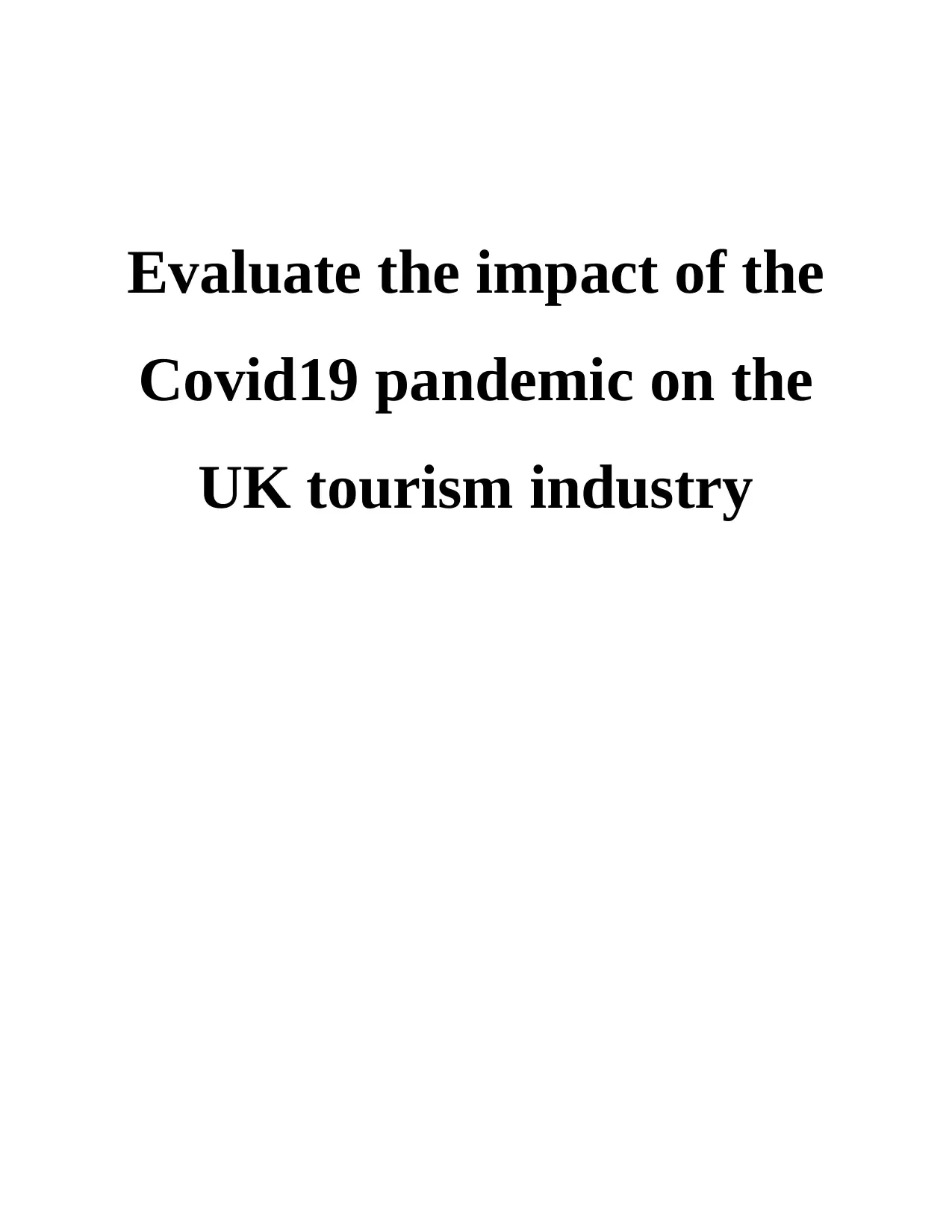
Evaluate the impact of the
Covid19 pandemic on the
UK tourism industry
Covid19 pandemic on the
UK tourism industry
Paraphrase This Document
Need a fresh take? Get an instant paraphrase of this document with our AI Paraphraser


Contents
INTRODUCTION...........................................................................................................................................3
MAIN BODY.................................................................................................................................................3
REFERENCES................................................................................................................................................8
INTRODUCTION...........................................................................................................................................3
MAIN BODY.................................................................................................................................................3
REFERENCES................................................................................................................................................8
⊘ This is a preview!⊘
Do you want full access?
Subscribe today to unlock all pages.

Trusted by 1+ million students worldwide
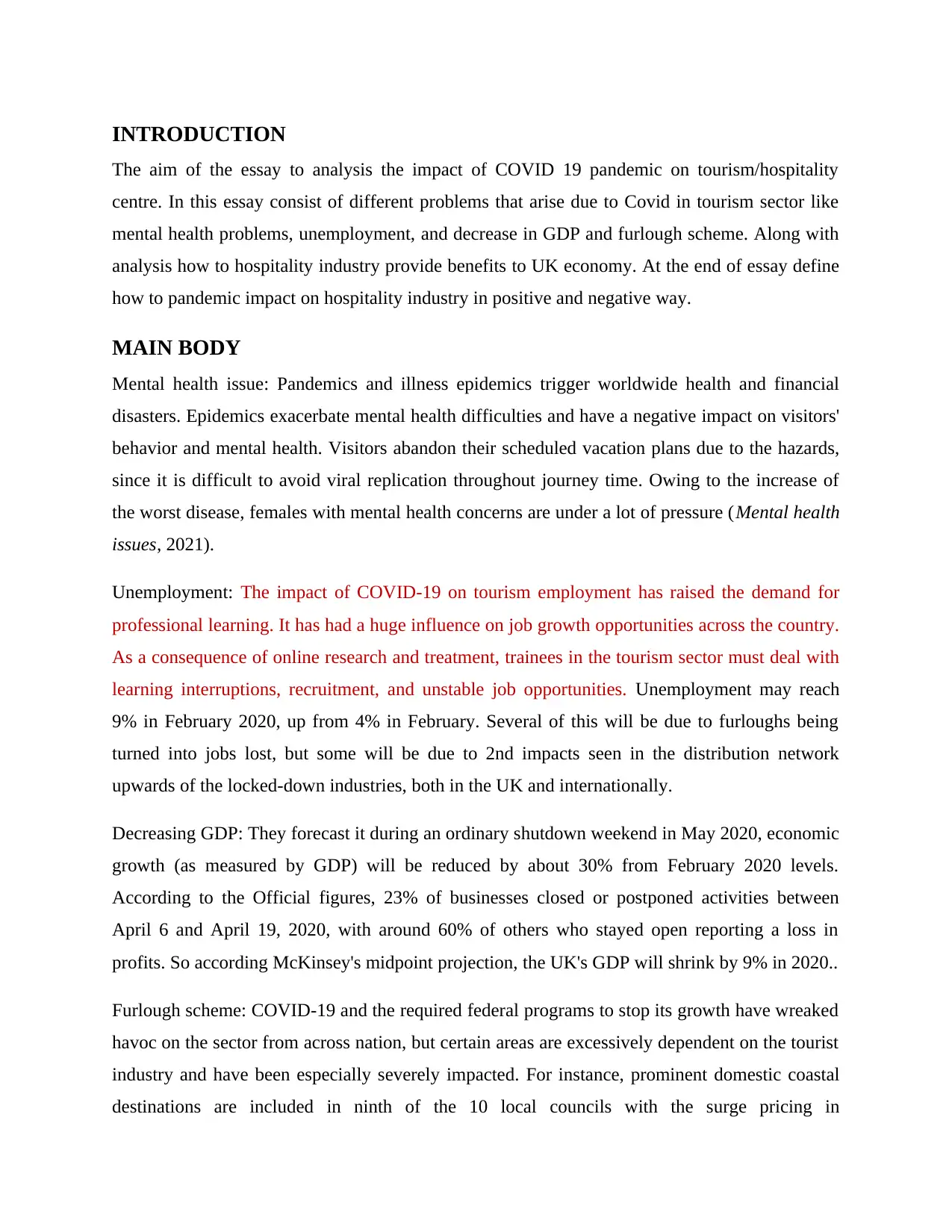
INTRODUCTION
The aim of the essay to analysis the impact of COVID 19 pandemic on tourism/hospitality
centre. In this essay consist of different problems that arise due to Covid in tourism sector like
mental health problems, unemployment, and decrease in GDP and furlough scheme. Along with
analysis how to hospitality industry provide benefits to UK economy. At the end of essay define
how to pandemic impact on hospitality industry in positive and negative way.
MAIN BODY
Mental health issue: Pandemics and illness epidemics trigger worldwide health and financial
disasters. Epidemics exacerbate mental health difficulties and have a negative impact on visitors'
behavior and mental health. Visitors abandon their scheduled vacation plans due to the hazards,
since it is difficult to avoid viral replication throughout journey time. Owing to the increase of
the worst disease, females with mental health concerns are under a lot of pressure (Mental health
issues, 2021).
Unemployment: The impact of COVID-19 on tourism employment has raised the demand for
professional learning. It has had a huge influence on job growth opportunities across the country.
As a consequence of online research and treatment, trainees in the tourism sector must deal with
learning interruptions, recruitment, and unstable job opportunities. Unemployment may reach
9% in February 2020, up from 4% in February. Several of this will be due to furloughs being
turned into jobs lost, but some will be due to 2nd impacts seen in the distribution network
upwards of the locked-down industries, both in the UK and internationally.
Decreasing GDP: They forecast it during an ordinary shutdown weekend in May 2020, economic
growth (as measured by GDP) will be reduced by about 30% from February 2020 levels.
According to the Official figures, 23% of businesses closed or postponed activities between
April 6 and April 19, 2020, with around 60% of others who stayed open reporting a loss in
profits. So according McKinsey's midpoint projection, the UK's GDP will shrink by 9% in 2020..
Furlough scheme: COVID-19 and the required federal programs to stop its growth have wreaked
havoc on the sector from across nation, but certain areas are excessively dependent on the tourist
industry and have been especially severely impacted. For instance, prominent domestic coastal
destinations are included in ninth of the 10 local councils with the surge pricing in
The aim of the essay to analysis the impact of COVID 19 pandemic on tourism/hospitality
centre. In this essay consist of different problems that arise due to Covid in tourism sector like
mental health problems, unemployment, and decrease in GDP and furlough scheme. Along with
analysis how to hospitality industry provide benefits to UK economy. At the end of essay define
how to pandemic impact on hospitality industry in positive and negative way.
MAIN BODY
Mental health issue: Pandemics and illness epidemics trigger worldwide health and financial
disasters. Epidemics exacerbate mental health difficulties and have a negative impact on visitors'
behavior and mental health. Visitors abandon their scheduled vacation plans due to the hazards,
since it is difficult to avoid viral replication throughout journey time. Owing to the increase of
the worst disease, females with mental health concerns are under a lot of pressure (Mental health
issues, 2021).
Unemployment: The impact of COVID-19 on tourism employment has raised the demand for
professional learning. It has had a huge influence on job growth opportunities across the country.
As a consequence of online research and treatment, trainees in the tourism sector must deal with
learning interruptions, recruitment, and unstable job opportunities. Unemployment may reach
9% in February 2020, up from 4% in February. Several of this will be due to furloughs being
turned into jobs lost, but some will be due to 2nd impacts seen in the distribution network
upwards of the locked-down industries, both in the UK and internationally.
Decreasing GDP: They forecast it during an ordinary shutdown weekend in May 2020, economic
growth (as measured by GDP) will be reduced by about 30% from February 2020 levels.
According to the Official figures, 23% of businesses closed or postponed activities between
April 6 and April 19, 2020, with around 60% of others who stayed open reporting a loss in
profits. So according McKinsey's midpoint projection, the UK's GDP will shrink by 9% in 2020..
Furlough scheme: COVID-19 and the required federal programs to stop its growth have wreaked
havoc on the sector from across nation, but certain areas are excessively dependent on the tourist
industry and have been especially severely impacted. For instance, prominent domestic coastal
destinations are included in ninth of the 10 local councils with the surge pricing in
Paraphrase This Document
Need a fresh take? Get an instant paraphrase of this document with our AI Paraphraser
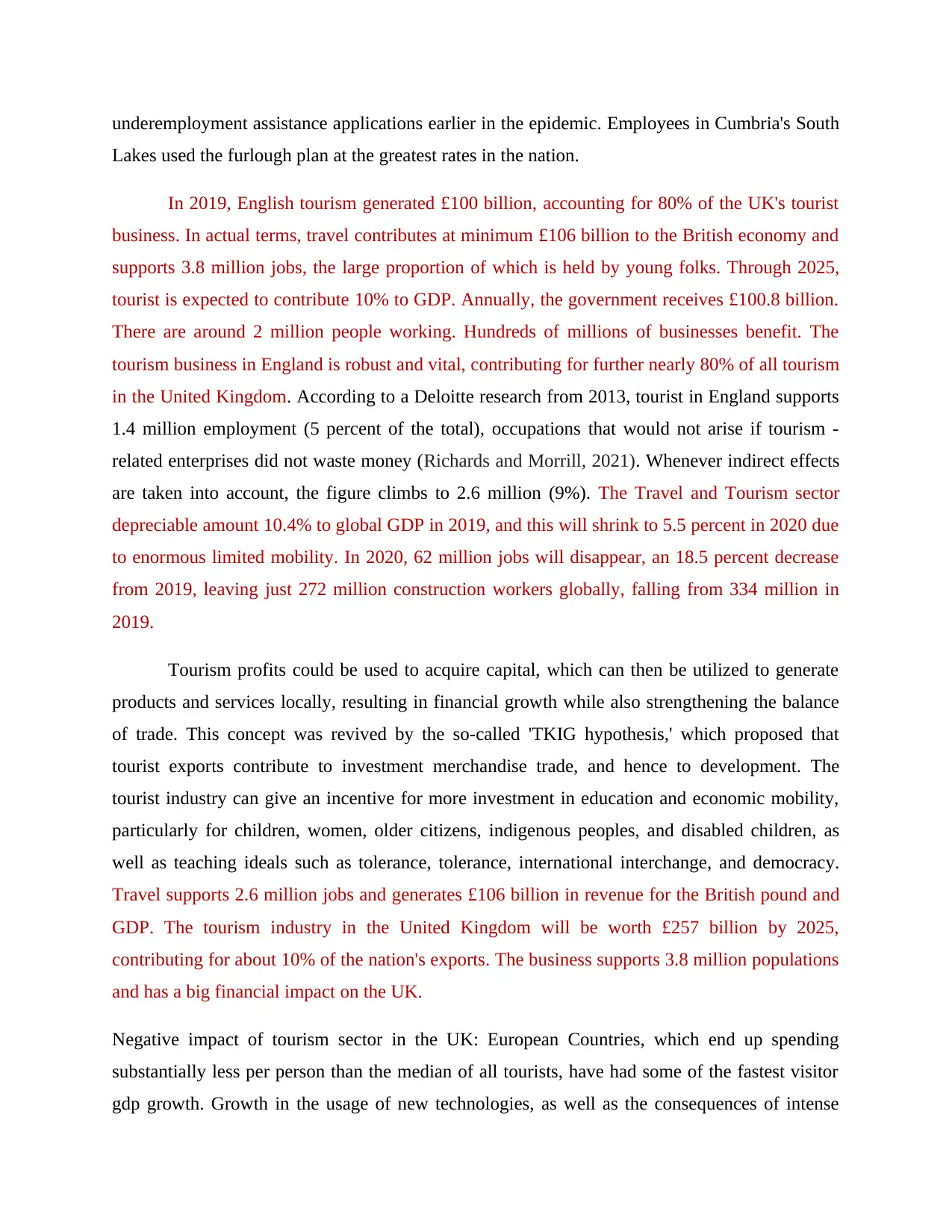
underemployment assistance applications earlier in the epidemic. Employees in Cumbria's South
Lakes used the furlough plan at the greatest rates in the nation.
In 2019, English tourism generated £100 billion, accounting for 80% of the UK's tourist
business. In actual terms, travel contributes at minimum £106 billion to the British economy and
supports 3.8 million jobs, the large proportion of which is held by young folks. Through 2025,
tourist is expected to contribute 10% to GDP. Annually, the government receives £100.8 billion.
There are around 2 million people working. Hundreds of millions of businesses benefit. The
tourism business in England is robust and vital, contributing for further nearly 80% of all tourism
in the United Kingdom. According to a Deloitte research from 2013, tourist in England supports
1.4 million employment (5 percent of the total), occupations that would not arise if tourism -
related enterprises did not waste money (Richards and Morrill, 2021). Whenever indirect effects
are taken into account, the figure climbs to 2.6 million (9%). The Travel and Tourism sector
depreciable amount 10.4% to global GDP in 2019, and this will shrink to 5.5 percent in 2020 due
to enormous limited mobility. In 2020, 62 million jobs will disappear, an 18.5 percent decrease
from 2019, leaving just 272 million construction workers globally, falling from 334 million in
2019.
Tourism profits could be used to acquire capital, which can then be utilized to generate
products and services locally, resulting in financial growth while also strengthening the balance
of trade. This concept was revived by the so-called 'TKIG hypothesis,' which proposed that
tourist exports contribute to investment merchandise trade, and hence to development. The
tourist industry can give an incentive for more investment in education and economic mobility,
particularly for children, women, older citizens, indigenous peoples, and disabled children, as
well as teaching ideals such as tolerance, tolerance, international interchange, and democracy.
Travel supports 2.6 million jobs and generates £106 billion in revenue for the British pound and
GDP. The tourism industry in the United Kingdom will be worth £257 billion by 2025,
contributing for about 10% of the nation's exports. The business supports 3.8 million populations
and has a big financial impact on the UK.
Negative impact of tourism sector in the UK: European Countries, which end up spending
substantially less per person than the median of all tourists, have had some of the fastest visitor
gdp growth. Growth in the usage of new technologies, as well as the consequences of intense
Lakes used the furlough plan at the greatest rates in the nation.
In 2019, English tourism generated £100 billion, accounting for 80% of the UK's tourist
business. In actual terms, travel contributes at minimum £106 billion to the British economy and
supports 3.8 million jobs, the large proportion of which is held by young folks. Through 2025,
tourist is expected to contribute 10% to GDP. Annually, the government receives £100.8 billion.
There are around 2 million people working. Hundreds of millions of businesses benefit. The
tourism business in England is robust and vital, contributing for further nearly 80% of all tourism
in the United Kingdom. According to a Deloitte research from 2013, tourist in England supports
1.4 million employment (5 percent of the total), occupations that would not arise if tourism -
related enterprises did not waste money (Richards and Morrill, 2021). Whenever indirect effects
are taken into account, the figure climbs to 2.6 million (9%). The Travel and Tourism sector
depreciable amount 10.4% to global GDP in 2019, and this will shrink to 5.5 percent in 2020 due
to enormous limited mobility. In 2020, 62 million jobs will disappear, an 18.5 percent decrease
from 2019, leaving just 272 million construction workers globally, falling from 334 million in
2019.
Tourism profits could be used to acquire capital, which can then be utilized to generate
products and services locally, resulting in financial growth while also strengthening the balance
of trade. This concept was revived by the so-called 'TKIG hypothesis,' which proposed that
tourist exports contribute to investment merchandise trade, and hence to development. The
tourist industry can give an incentive for more investment in education and economic mobility,
particularly for children, women, older citizens, indigenous peoples, and disabled children, as
well as teaching ideals such as tolerance, tolerance, international interchange, and democracy.
Travel supports 2.6 million jobs and generates £106 billion in revenue for the British pound and
GDP. The tourism industry in the United Kingdom will be worth £257 billion by 2025,
contributing for about 10% of the nation's exports. The business supports 3.8 million populations
and has a big financial impact on the UK.
Negative impact of tourism sector in the UK: European Countries, which end up spending
substantially less per person than the median of all tourists, have had some of the fastest visitor
gdp growth. Growth in the usage of new technologies, as well as the consequences of intense
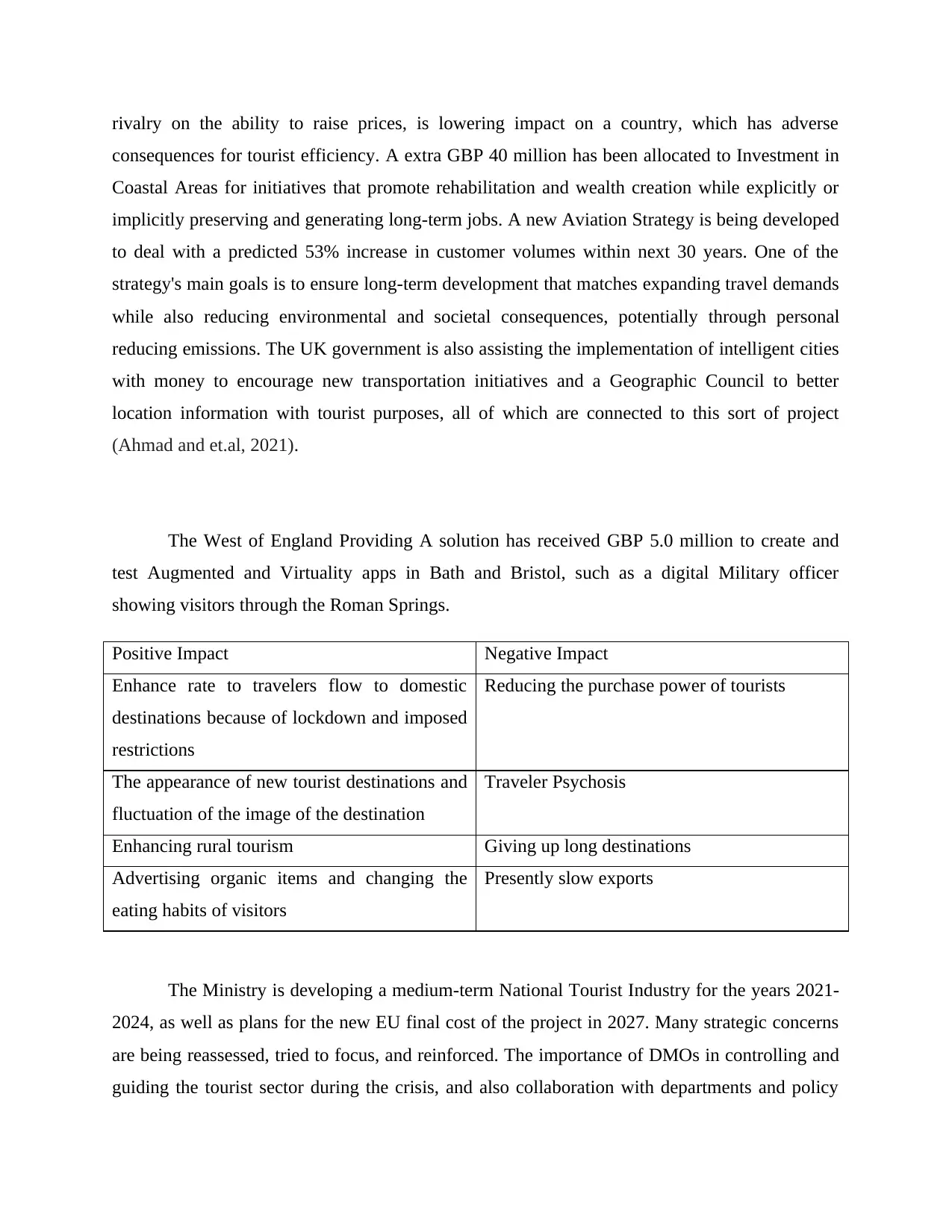
rivalry on the ability to raise prices, is lowering impact on a country, which has adverse
consequences for tourist efficiency. A extra GBP 40 million has been allocated to Investment in
Coastal Areas for initiatives that promote rehabilitation and wealth creation while explicitly or
implicitly preserving and generating long-term jobs. A new Aviation Strategy is being developed
to deal with a predicted 53% increase in customer volumes within next 30 years. One of the
strategy's main goals is to ensure long-term development that matches expanding travel demands
while also reducing environmental and societal consequences, potentially through personal
reducing emissions. The UK government is also assisting the implementation of intelligent cities
with money to encourage new transportation initiatives and a Geographic Council to better
location information with tourist purposes, all of which are connected to this sort of project
(Ahmad and et.al, 2021).
The West of England Providing A solution has received GBP 5.0 million to create and
test Augmented and Virtuality apps in Bath and Bristol, such as a digital Military officer
showing visitors through the Roman Springs.
Positive Impact Negative Impact
Enhance rate to travelers flow to domestic
destinations because of lockdown and imposed
restrictions
Reducing the purchase power of tourists
The appearance of new tourist destinations and
fluctuation of the image of the destination
Traveler Psychosis
Enhancing rural tourism Giving up long destinations
Advertising organic items and changing the
eating habits of visitors
Presently slow exports
The Ministry is developing a medium-term National Tourist Industry for the years 2021-
2024, as well as plans for the new EU final cost of the project in 2027. Many strategic concerns
are being reassessed, tried to focus, and reinforced. The importance of DMOs in controlling and
guiding the tourist sector during the crisis, and also collaboration with departments and policy
consequences for tourist efficiency. A extra GBP 40 million has been allocated to Investment in
Coastal Areas for initiatives that promote rehabilitation and wealth creation while explicitly or
implicitly preserving and generating long-term jobs. A new Aviation Strategy is being developed
to deal with a predicted 53% increase in customer volumes within next 30 years. One of the
strategy's main goals is to ensure long-term development that matches expanding travel demands
while also reducing environmental and societal consequences, potentially through personal
reducing emissions. The UK government is also assisting the implementation of intelligent cities
with money to encourage new transportation initiatives and a Geographic Council to better
location information with tourist purposes, all of which are connected to this sort of project
(Ahmad and et.al, 2021).
The West of England Providing A solution has received GBP 5.0 million to create and
test Augmented and Virtuality apps in Bath and Bristol, such as a digital Military officer
showing visitors through the Roman Springs.
Positive Impact Negative Impact
Enhance rate to travelers flow to domestic
destinations because of lockdown and imposed
restrictions
Reducing the purchase power of tourists
The appearance of new tourist destinations and
fluctuation of the image of the destination
Traveler Psychosis
Enhancing rural tourism Giving up long destinations
Advertising organic items and changing the
eating habits of visitors
Presently slow exports
The Ministry is developing a medium-term National Tourist Industry for the years 2021-
2024, as well as plans for the new EU final cost of the project in 2027. Many strategic concerns
are being reassessed, tried to focus, and reinforced. The importance of DMOs in controlling and
guiding the tourist sector during the crisis, and also collaboration with departments and policy
⊘ This is a preview!⊘
Do you want full access?
Subscribe today to unlock all pages.

Trusted by 1+ million students worldwide
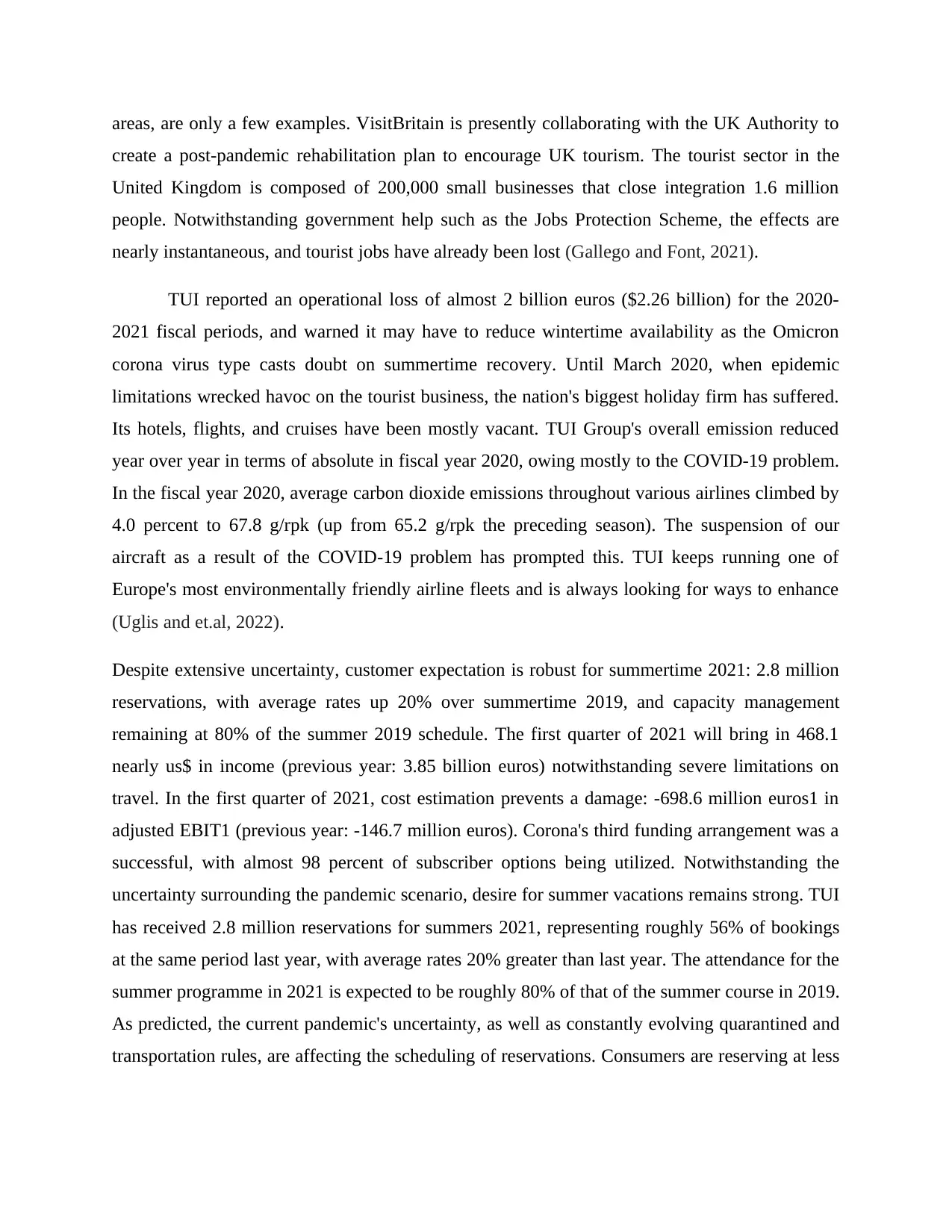
areas, are only a few examples. VisitBritain is presently collaborating with the UK Authority to
create a post-pandemic rehabilitation plan to encourage UK tourism. The tourist sector in the
United Kingdom is composed of 200,000 small businesses that close integration 1.6 million
people. Notwithstanding government help such as the Jobs Protection Scheme, the effects are
nearly instantaneous, and tourist jobs have already been lost (Gallego and Font, 2021).
TUI reported an operational loss of almost 2 billion euros ($2.26 billion) for the 2020-
2021 fiscal periods, and warned it may have to reduce wintertime availability as the Omicron
corona virus type casts doubt on summertime recovery. Until March 2020, when epidemic
limitations wrecked havoc on the tourist business, the nation's biggest holiday firm has suffered.
Its hotels, flights, and cruises have been mostly vacant. TUI Group's overall emission reduced
year over year in terms of absolute in fiscal year 2020, owing mostly to the COVID-19 problem.
In the fiscal year 2020, average carbon dioxide emissions throughout various airlines climbed by
4.0 percent to 67.8 g/rpk (up from 65.2 g/rpk the preceding season). The suspension of our
aircraft as a result of the COVID-19 problem has prompted this. TUI keeps running one of
Europe's most environmentally friendly airline fleets and is always looking for ways to enhance
(Uglis and et.al, 2022).
Despite extensive uncertainty, customer expectation is robust for summertime 2021: 2.8 million
reservations, with average rates up 20% over summertime 2019, and capacity management
remaining at 80% of the summer 2019 schedule. The first quarter of 2021 will bring in 468.1
nearly us$ in income (previous year: 3.85 billion euros) notwithstanding severe limitations on
travel. In the first quarter of 2021, cost estimation prevents a damage: -698.6 million euros1 in
adjusted EBIT1 (previous year: -146.7 million euros). Corona's third funding arrangement was a
successful, with almost 98 percent of subscriber options being utilized. Notwithstanding the
uncertainty surrounding the pandemic scenario, desire for summer vacations remains strong. TUI
has received 2.8 million reservations for summers 2021, representing roughly 56% of bookings
at the same period last year, with average rates 20% greater than last year. The attendance for the
summer programme in 2021 is expected to be roughly 80% of that of the summer course in 2019.
As predicted, the current pandemic's uncertainty, as well as constantly evolving quarantined and
transportation rules, are affecting the scheduling of reservations. Consumers are reserving at less
create a post-pandemic rehabilitation plan to encourage UK tourism. The tourist sector in the
United Kingdom is composed of 200,000 small businesses that close integration 1.6 million
people. Notwithstanding government help such as the Jobs Protection Scheme, the effects are
nearly instantaneous, and tourist jobs have already been lost (Gallego and Font, 2021).
TUI reported an operational loss of almost 2 billion euros ($2.26 billion) for the 2020-
2021 fiscal periods, and warned it may have to reduce wintertime availability as the Omicron
corona virus type casts doubt on summertime recovery. Until March 2020, when epidemic
limitations wrecked havoc on the tourist business, the nation's biggest holiday firm has suffered.
Its hotels, flights, and cruises have been mostly vacant. TUI Group's overall emission reduced
year over year in terms of absolute in fiscal year 2020, owing mostly to the COVID-19 problem.
In the fiscal year 2020, average carbon dioxide emissions throughout various airlines climbed by
4.0 percent to 67.8 g/rpk (up from 65.2 g/rpk the preceding season). The suspension of our
aircraft as a result of the COVID-19 problem has prompted this. TUI keeps running one of
Europe's most environmentally friendly airline fleets and is always looking for ways to enhance
(Uglis and et.al, 2022).
Despite extensive uncertainty, customer expectation is robust for summertime 2021: 2.8 million
reservations, with average rates up 20% over summertime 2019, and capacity management
remaining at 80% of the summer 2019 schedule. The first quarter of 2021 will bring in 468.1
nearly us$ in income (previous year: 3.85 billion euros) notwithstanding severe limitations on
travel. In the first quarter of 2021, cost estimation prevents a damage: -698.6 million euros1 in
adjusted EBIT1 (previous year: -146.7 million euros). Corona's third funding arrangement was a
successful, with almost 98 percent of subscriber options being utilized. Notwithstanding the
uncertainty surrounding the pandemic scenario, desire for summer vacations remains strong. TUI
has received 2.8 million reservations for summers 2021, representing roughly 56% of bookings
at the same period last year, with average rates 20% greater than last year. The attendance for the
summer programme in 2021 is expected to be roughly 80% of that of the summer course in 2019.
As predicted, the current pandemic's uncertainty, as well as constantly evolving quarantined and
transportation rules, are affecting the scheduling of reservations. Consumers are reserving at less
Paraphrase This Document
Need a fresh take? Get an instant paraphrase of this document with our AI Paraphraser

notification and hence earlier this year, as was the situation previous spring and autumn (Vaishar
and Šťastná, 2022).
and Šťastná, 2022).
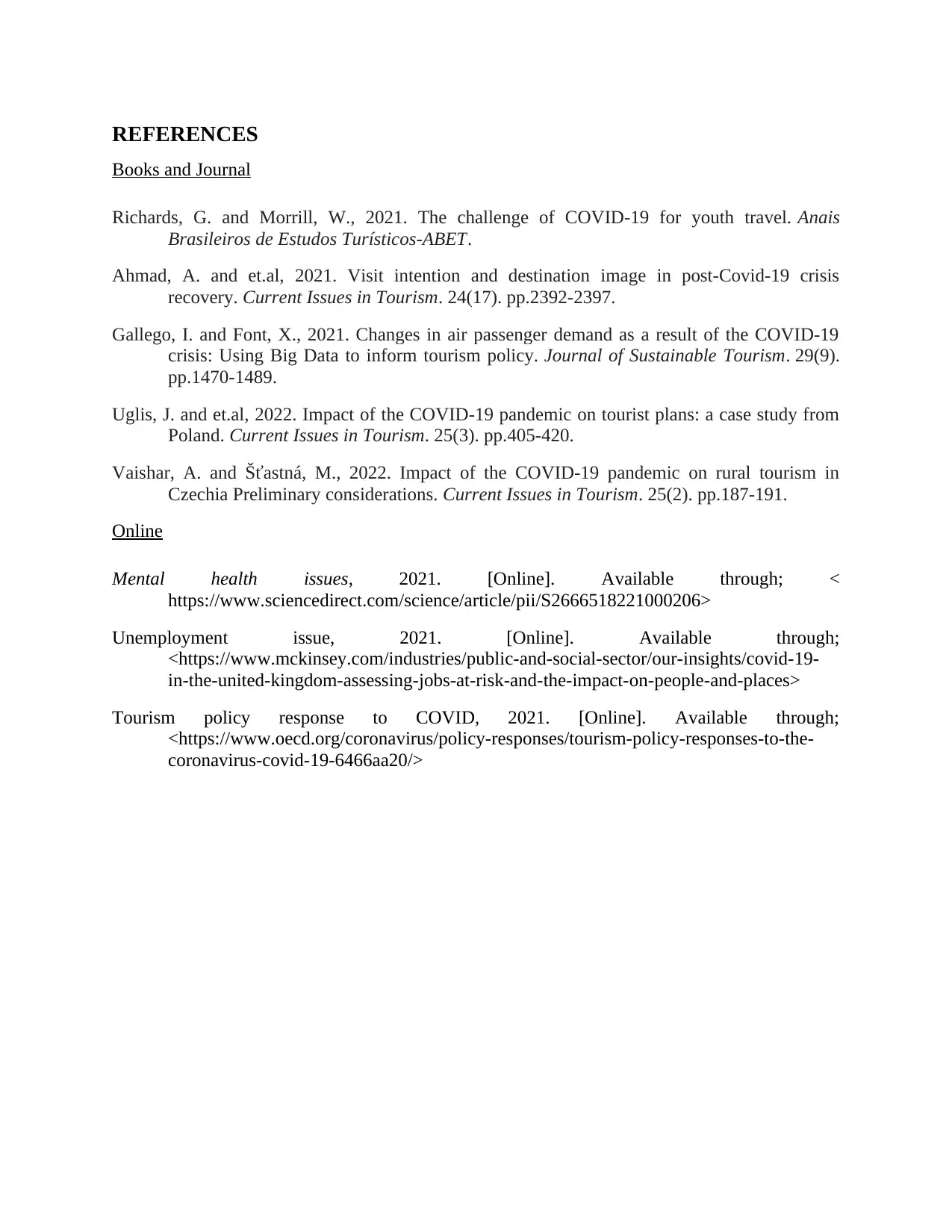
REFERENCES
Books and Journal
Richards, G. and Morrill, W., 2021. The challenge of COVID-19 for youth travel. Anais
Brasileiros de Estudos Turísticos-ABET.
Ahmad, A. and et.al, 2021. Visit intention and destination image in post-Covid-19 crisis
recovery. Current Issues in Tourism. 24(17). pp.2392-2397.
Gallego, I. and Font, X., 2021. Changes in air passenger demand as a result of the COVID-19
crisis: Using Big Data to inform tourism policy. Journal of Sustainable Tourism. 29(9).
pp.1470-1489.
Uglis, J. and et.al, 2022. Impact of the COVID-19 pandemic on tourist plans: a case study from
Poland. Current Issues in Tourism. 25(3). pp.405-420.
Vaishar, A. and Šťastná, M., 2022. Impact of the COVID-19 pandemic on rural tourism in
Czechia Preliminary considerations. Current Issues in Tourism. 25(2). pp.187-191.
Online
Mental health issues, 2021. [Online]. Available through; <
https://www.sciencedirect.com/science/article/pii/S2666518221000206>
Unemployment issue, 2021. [Online]. Available through;
<https://www.mckinsey.com/industries/public-and-social-sector/our-insights/covid-19-
in-the-united-kingdom-assessing-jobs-at-risk-and-the-impact-on-people-and-places>
Tourism policy response to COVID, 2021. [Online]. Available through;
<https://www.oecd.org/coronavirus/policy-responses/tourism-policy-responses-to-the-
coronavirus-covid-19-6466aa20/>
Books and Journal
Richards, G. and Morrill, W., 2021. The challenge of COVID-19 for youth travel. Anais
Brasileiros de Estudos Turísticos-ABET.
Ahmad, A. and et.al, 2021. Visit intention and destination image in post-Covid-19 crisis
recovery. Current Issues in Tourism. 24(17). pp.2392-2397.
Gallego, I. and Font, X., 2021. Changes in air passenger demand as a result of the COVID-19
crisis: Using Big Data to inform tourism policy. Journal of Sustainable Tourism. 29(9).
pp.1470-1489.
Uglis, J. and et.al, 2022. Impact of the COVID-19 pandemic on tourist plans: a case study from
Poland. Current Issues in Tourism. 25(3). pp.405-420.
Vaishar, A. and Šťastná, M., 2022. Impact of the COVID-19 pandemic on rural tourism in
Czechia Preliminary considerations. Current Issues in Tourism. 25(2). pp.187-191.
Online
Mental health issues, 2021. [Online]. Available through; <
https://www.sciencedirect.com/science/article/pii/S2666518221000206>
Unemployment issue, 2021. [Online]. Available through;
<https://www.mckinsey.com/industries/public-and-social-sector/our-insights/covid-19-
in-the-united-kingdom-assessing-jobs-at-risk-and-the-impact-on-people-and-places>
Tourism policy response to COVID, 2021. [Online]. Available through;
<https://www.oecd.org/coronavirus/policy-responses/tourism-policy-responses-to-the-
coronavirus-covid-19-6466aa20/>
⊘ This is a preview!⊘
Do you want full access?
Subscribe today to unlock all pages.

Trusted by 1+ million students worldwide
1 out of 9
Related Documents
Your All-in-One AI-Powered Toolkit for Academic Success.
+13062052269
info@desklib.com
Available 24*7 on WhatsApp / Email
![[object Object]](/_next/static/media/star-bottom.7253800d.svg)
Unlock your academic potential
Copyright © 2020–2026 A2Z Services. All Rights Reserved. Developed and managed by ZUCOL.



